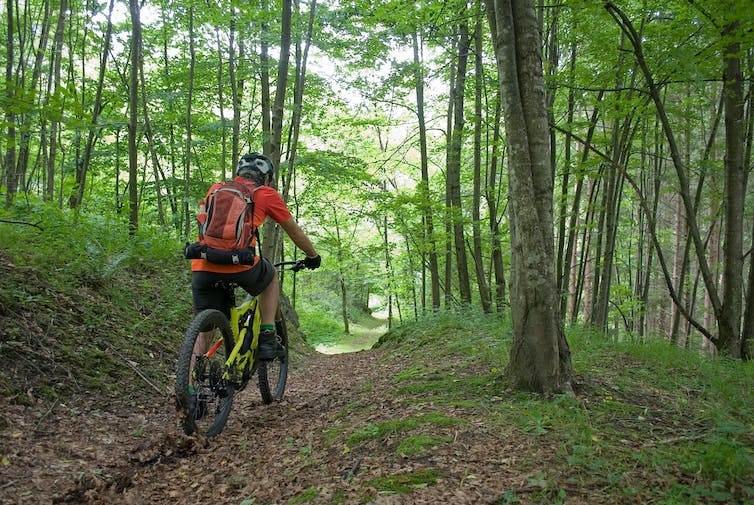Are e-bikes ruining mountain biking?
We came across this article which will have increasing relevance as time rolls ever onwards and more and more bikes appear on the hills...
Wales Outdoors are of the opinion that e-bikes are a bad thing, that they are resource heavy, that they demand of the rider less fitness and so if there is an issue they are potentially very dangerous indeed. Further, the speed we've seen these things shooting along paths in Cardiff is a recipe for confrontation and injury. And then there is the perfect storm for criminals, mandated masks and unidentifiable transport that can do up to 40 miles an hour (if de-limited).
We have always been of the opinion that less is more. E-bikes are more and likely will site in a garage for a few years and then when use them the owner decides to do the battery is dysfunctional and a replacement for that design is no longer possible. The bike is then, effectively, scrap.
Of course, an e-bike can get the less able into remoter areas, but seriously, is that a good thing outside of an organised and guided group? Anyways, here's the article (original location here - https://theconversation.com/are-e-bikes-ruining-mountain-biking-166121 ):
Sales of electric bikes have increased dramatically recently. In 2020, 4.6 million e-bikes were sold in the EU and UK, a 52% rise year on year. In the UK, nearly one in three adult bikes sold are now electric.
https://embed-player.newsoveraudio.com/v4?key=x84olp&id=https://theconversation.com/are-e-bikes-ruining-mountain-biking-166121&bgColor=F5F5F5&color=D8352A&playColor=D8352A
As a specific category of e-bike, e-mountain bikes can increase the accessibility of the outdoors for riders who would otherwise be socially or physically excluded. They can also help to equalise the cycling competencies of different riders.
But they are also the subject of much controversy, as e-bikes allow riders to go much further and faster in the countryside. This has led to an intense debate between cyclists, horse riders and walkers about what constitutes acceptable levels of speed, noise and erosion from this new technology.
We only trust experts. We only publish experts. Support us
Donate now
Indeed, on social networking sites and various internet forums, there is also a widespread perception that e-mountain bike riders are selfish, lazy and anti-social. These riders are also accused of being overly reliant on the motor and of travelling at speeds that are unsafe for other users of the countryside – which is said to result in damage to biking trails and the wider environment.
Environmental implications
The introduction of a motor and a battery to an all-terrain bicycle may create the potential for many more cyclists to access the great outdoors. But the heavier components, wider tyres and added torque raise concern among many riders about the potential environmental impact.
Our research shows that traditional mountain-biking involves a complex relationship between riders, bikes and terrain. Through careful experimentation and progression, riders learn to be attentive to the limits and abilities of their body and their bike. And in doing so, they gain a deep appreciation for both the feel of the trail and the topography of the landscape.
This has been shown to influence their encounters with other user groups, as mountain bikers make concessions for walkers and horse riders based on a mutual understanding of the terrain. Riders will often give way to walkers travelling uphill and may choose to wait before passing horses on rugged trails to avoid dislodging objects that may strike or startle the animal.
The fear with e-bikes is that the addition of a motor makes users complacent about the demands of the terrain, and the needs of other people – with riders prioritising getting uphill as quickly as possible, or going as far as they can on a single battery.
But while a lot of these fears and complaints may well be valid, most are based on anecdotal evidence rather than any actual research. So as part of our latest project, that hasn’t yet been published, we’ve spoken with 30 e-bike riders in England to find out more about why people choose e-bikes and how they actually ride them. What our findings indicate so far is that electric mountain bike users are often more responsible than perceptions might suggest.
The benefits
Participants we have spoken to so far have told us how they constantly ask other (non-e-bike) riders how tired they are or how difficult the terrain is to ride, to accommodate the pace and energy levels of the group.
When cycling with non-e-bikers, participants also told us that they position themselves at the back to avoid “rubbing other people’s noses in it”, while some have said that they have swapped bikes with others when they are too tired to go on.

E-bikes also seem to have a wider social role in relation to crime, ill-health and social exclusion. One participant – a disabled former soldier – said his e-bike has been the springboard for a new social enterprise that tackles youth offending through cycling. We’ve also heard from several older participants who said purchasing an e-bike has led to vast improvements in their physical and mental well-being.
Risks and gains
On the other hand, we’ve also had reports of riders barging through groups of walkers. And one of our participants, who works in the bike industry, was aware of two instances where e-mountain bike riders had gone too far into the wilderness, run out of battery, and needed to call the air ambulance.
This concern is further illustrated by some of the riders’ relationships with the battery and on-board computer. Even though our research is still ongoing, numerous participants have described how the Bluetooth link between their bikes and GPS tracking apps such as Strava allowed them to “compete” more effectively against their friends.

These are isolated incidents, but they reinforce existing studies that illustrate how tracking devices can be enrolled with other forms of technology in sport and physical activity to enable immoral, disrespectful and irresponsible forms of behaviour. The use of Strava to encourage fast and competitive riding has also been linked with increased trail damage and surface erosion.
To quote the popular mountain bike commentator Rob Warner, “electric mountain bikes represent the most significant thing to happen to mountain biking since mountain biking”. They allow people to overcome a range of social and physical barriers and engage in more outdoor exercise.
But questions remain as to whether the risk to the environment outweighs the potential gains for culture, health and society. More research is needed to ensure that future conversations are informed by evidence, rather than anecdotes.




